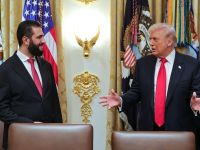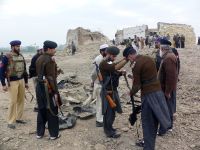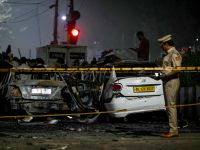Arab leaders will conclude their emergency summit on the Palestinian crisis in Cairo Sunday against a backdrop of continued violence in the occupied territories and an Israeli threat to suspend the peace process indefinitely.
A final draft being prepared by foreign ministers calls on Arab countries to "take all measures concerning relations" with Israel "including their cancellation," Arab officials said, thereby leaving the decision to individual countries.
Israel acknowledged that some Arab leaders were "calling for responsible and positive attitudes in the current situation," singling out Egyptian President Hosni Mubarak, the summit's host, for his moderation.
While the Arab leaders leaned toward limited action against Israel in the first day of their meeting, hawkish sentiment was not hard to find.
Libya walked out of the emergency summit complaining that the forum was too soft on Israel after its bloody crackdown on the Palestinians.
Libya, which had been pushing for a complete rupture of ties with Israel, walked out of the summit, releasing a statement complaining the meeting "would take no concrete decision likely to end Israel's aggressive practices."
Tripoli was represented at the summit by its permanent delegate to the Arab League after leader Moammer Kadhafi decided to boycott the talks.
Syrian President Bashar Assad called for a halt to all normalization with Israel and a new boycott of the Jewish state, which should be made "to pay the price" for spilt Palestinian blood.
Hundreds of thousands of Arabs around the Middle East took to the streets demanding that the Arab leaders take firm action to punish Israel for the deaths of more than 100 Palestinians.
Probably the largest protest was in Yemen's capital Sanaa, where organizers said 1.5 million demonstrators turned up to pledge holy war against Israel.
The protests followed calls by major Palestinian groups -- including Palestinian leader Yasser Arafat's Fateh movement -- to support the Intifada, or uprising, despite Israeli Prime Minister Ehud Barak's threat to suspend the moribund peace process altogether if violence does not subside by the time the Arab summit ends.
Arafat vowed Saturday to continue the uprising against Israel, comments which seemed to finally scupper a US-brokered truce with Israel made four days earlier at the Sharm el-Sheikh summit in Egypt.
The Palestinian leader delivered a fiery speech before his Arab counterparts, warning that "the collective massacre" of his people by Israel could spark "religious wars".
Israel swiftly denounced Arafat, calling his speech "very extreme with baseless, provocative allegations towards Israel".
The Israeli-Palestinian fighting has so far claimed over 120 victims. the vast majority of them Palestinians.
The clashes continued unabated Saturday, with at least five Palestinians -- including four teenagers -- killed and 200 wounded in clashes with Israeli troops.
Violence flared throughout much of the West Bank and Gaza Strip following the funerals of nine Palestinians killed Friday.
However the Arab leaders at their summit in Cairo appeared to be moving to tone down the draft document that had urged certain Arab states to break ties with Israel. The new version would allow each country to decide on its own measures.
Meanwhile, Israel's acting Foreign Minister Shlomo Ben Ami urged his country to keep the door open for a diplomatic solution despite the looming "time-out."
"In the crisis situation we are going through, we must maintain a balance between the conflict that has been imposed on us and the diplomatic efforts we must not abandon," Ben Ami said in a statement.
Earlier in the day Israel rejected a UN General Assembly resolution, approved by a large majority, to condemn what it called Israel's excessive use of force against Palestinian civilians - CAIRO (AFP)
© 2000 Al Bawaba (www.albawaba.com)







